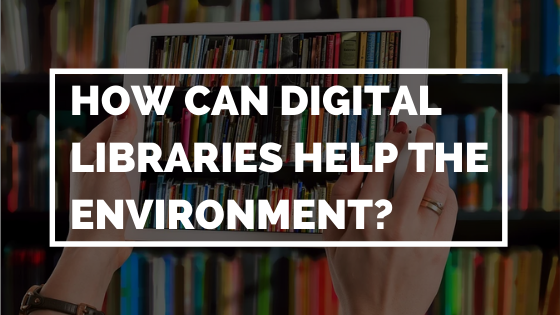We have all read about initiatives different libraries are taking in order to save the environment. However, more often than not, these initiatives are for the traditional, “physical” libraries. But how can a digital library help the environment? Guest writer Robin Jeanne shares her opinions in this week’s Princh Library Blog.
It’s true that there’s nothing like the smell of a paper book, but you might want to think about its environmental impact the next time you purchase one. In the U.S. alone, roughly 32 million trees are used annually to make books, with the production process emitting over 40 million metric tons of carbon dioxide.
Of course, you don’t have to give up reading altogether, as there are other ways to indulge in your favorite novels — through e-readers and digital libraries, for instance. Though e-readers face their own share of problems when it comes to their carbon footprint, they’re actually better for the environment over the long term if you’re a particularly avid reader. In this article, we’ll walk you through the technology behind digital libraries and how they help save the environment.
E-books and the cloud
Digital libraries use technology called cloud computing. This simply means that computers store and access data over the internet instead of on their local hardware. With powerful servers running behind the scenes, the cloud is capable of storing just about anything — from e-books to highly classified information.
Cloud computing underpins most of today’s digital innovations, like social media websites and company databases. It’s all thanks to modern PCBs or circuit boards, which have enabled data storage systems (the backend of the cloud system) to store vast amounts of information in a small structure. Likewise, these circuit boards can also process this data at lightning-fast speeds. In the context of digital libraries, the cloud has helped users access, curate, and preserve a huge collection of knowledge with just a computer and an internet connection. This is not only more convenient, but it also has positive implications for the environment.
How digital libraries help save the environment
Digital libraries can contribute to sustainability in a number of ways. We’ve already mentioned the first, which is dematerialization. This means replacing resource-intensive physical products with virtual equivalents. Migrating to digital libraries will help reduce greenhouse gas emissions resulting from the creation, packaging, and delivery of books. Plus, according to a 2014 lifecycle analysis of printed books, a single e-reader is equivalent to 40 to 50 books in terms of raw materials. So, the more you e-read, the higher the environmental returns will be. And with e-readers lasting for years before you need to upgrade them, this threshold shouldn’t be difficult to reach.
In addition, physical libraries require plenty of energy to run. Electricity, air conditioning, computers, and local library servers all eat up considerable amounts of electricity. Aggregating library services to the cloud will not only help simplify operations, but also reduce power bills.
The cloud computing sector has become a leading player in renewable energy in recent years. In fact, tech giants like Google, Microsoft, and Amazon have already signed power purchase agreements — agreeing to power their servers using green energy. Cloud service providers have also prioritized building their facilities in sustainable sites that provide green energy, like the Quebec region, which is full of hydropower plants. This not only paves the way for the increased growth of renewable energy sources, but also saves billions of dollars in carbon emissions and energy costs.
Digital libraries in practice
Today many digital libraries already exist, mostly as a supplement and back-ups to print editions in their physical counterparts. But the advent of COVID-19 has highlighted the necessity of digitizing libraries, especially now that the coronavirus has forced most schools to close indefinitely. Thus, aside from alleviating the environmental burden of the publishing industry, digital libraries also play a role in preserving and democratizing knowledge for everyone.
There’s no doubt that libraries will remain relevant well into the future, as the information they contain is indispensable in building an intellectually free society. Perhaps the only thing that will change is where and how we read books.
Article written by:
Robin Jeanne
Recent posts
Green Libraries: How Sustainable Design is Shaping the Future of Public Libraries
In this week's Princh Library Blog post, recurring guest writer Sam L. Bowman discusses an ever so important topic: sustainable design and [...]
Librarians Supporting Digital Literacy in the Community
In this week's Princh Library Blog, Nina Grant covers why digital literacy is important, the variety of ways in which librarians are supporting [...]






Leave A Comment